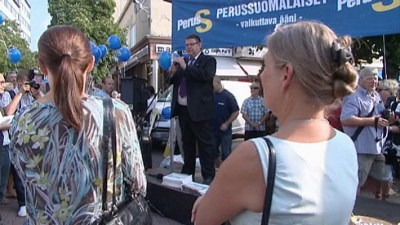Political
Economy
The
Market Quotes Powered By Forexpros, the Forex, Futures, and Stock Markets Portal.
Correlation between tough economic times and the strengthening of far rights
Monday, 12 March 2012
During times of
economic hardship or a crisis, the tendency tend to be that the
political elections held in several countries this year is extra
important. This is because the likelihood increases that populist
rightwing parties are gaining ground as they make lofty promises of
things like “taking our country back from them”.
Frederick
Langdal is a political scientist and researcher at Sieps, Institute for
European Policy Studies and he speaks to radio Sweden:
“One of the
more worrying scenarios is that the economic crisis contributes to the
radicalization of politics. That is to say that you are getting an
increasing number of larger populist parties which are gaining
influence over the former’s policies.”
 He
believes that the economic crisis have a social impact in the form of,
for example, more long-term unemployed. Exclusion can make more people
to vote for populist radical parties. Political parties that are often
talking about globalization are seen as a threat to national cohesion
and self economic development.
This is already noticeable in the Finnish parliamentary elections last year, according to Fredrik Langdal.
“You could see
the True Finns politicized euro-issue and issue of aid to Greece. This
is the clearest example we have so far on how the euro crisis has
become politicized in this way.”
Economists warn
that such political currents in turn will have impact on economic
activity. Annika Winsth, chief economist at Nordea, says tat there is
high risk that populist parties promise voters too much.
“If the market
loses confidence in you to carry out the action promised, that will
raise the cost to the countries. You’ll get to borrow at higher
interest rate if you can borrow at all. Then you get to cyclical
effects, firms can not invest, households can not consume or invest,
and then we get a weaker economy with less labour, and it affects
ordinary people.”
This is not what the modern Europe wants or is it?
By Scancomark.se Team
He
believes that the economic crisis have a social impact in the form of,
for example, more long-term unemployed. Exclusion can make more people
to vote for populist radical parties. Political parties that are often
talking about globalization are seen as a threat to national cohesion
and self economic development.
This is already noticeable in the Finnish parliamentary elections last year, according to Fredrik Langdal.
“You could see
the True Finns politicized euro-issue and issue of aid to Greece. This
is the clearest example we have so far on how the euro crisis has
become politicized in this way.”
Economists warn
that such political currents in turn will have impact on economic
activity. Annika Winsth, chief economist at Nordea, says tat there is
high risk that populist parties promise voters too much.
“If the market
loses confidence in you to carry out the action promised, that will
raise the cost to the countries. You’ll get to borrow at higher
interest rate if you can borrow at all. Then you get to cyclical
effects, firms can not invest, households can not consume or invest,
and then we get a weaker economy with less labour, and it affects
ordinary people.”
This is not what the modern Europe wants or is it?
By Scancomark.se Team
What do you think about this article
and us? Please leave a comment
 © Scandinavian Companies and Market
Magazine
2012. | Scandinavian
Companies and Market and Scancomark are registered trade mark of
Scandinavian Companies and Market.
© Scandinavian Companies and Market
Magazine
2012. | Scandinavian
Companies and Market and Scancomark are registered trade mark of
Scandinavian Companies and Market.


 He
believes that the economic crisis have a social impact in the form of,
for example, more long-term unemployed. Exclusion can make more people
to vote for populist radical parties. Political parties that are often
talking about globalization are seen as a threat to national cohesion
and self economic development.
He
believes that the economic crisis have a social impact in the form of,
for example, more long-term unemployed. Exclusion can make more people
to vote for populist radical parties. Political parties that are often
talking about globalization are seen as a threat to national cohesion
and self economic development.